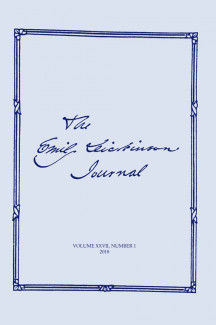
Johns Hopkins UniversityEst. 1876
America’s First Research University
Professor Sums Up Dickinson's Math

Five years ago, Grinnell College professor Thomas L. Moore audited an English class on Walt Whitman and Emily Dickinson at his institution. A Professor, Emeritus in the Department of Mathematics and Statistics at Grinnell, Moore worked over several years on a paper for that class. Earlier this year, the Emily Dickinson Journal published the final product, "Q.E.D.:What Emily Dickinson Did With Her Mathematics Books." Moore joined us for a Q&A to talk about how an accomplished math scholar ended up publishing in a literary criticism journal studying the work of just one author.
What is it like to see a topic from a seminar you audited turn into a published essay?

Three years later I turned in a paper and those three years were marked by long-hiatuses and incubation periods with low confidence that I’d get a paper written. But finally I narrowed my topic: from mathematics in general, to mathematics textbooks, to one particular textbook and a small set of poems. Then Steve read and gave me the surprise of suggesting publication and the EDJ. That led to another year of working from his suggestions to improving the essay, much of that year including more hiatuses and doubts. Steve’s suggestions were not trivial and he graciously read and commented on further drafts.
When I look back on the process, all those little surprises accumulate into a very big one. I really enjoyed writing the essay, reflecting on the process along the way, realizing the power of the mind to work out problems even as you’ve stepped away from the writing to let things incubate. The mathematician Poincaré talked about the importance of incubation periods in solving mathematics problems, but I found it also important in literary problems.
How does a career teaching at a liberal arts institution sow the seeds for a project like this?
At a place like Grinnell, cross-disciplinary work is in the air. Colleagues know one another across departments; Grinnell College is small. So it felt natural to ask Steve to audit his class. The impetus for asking was simply reading Dickinson, being intrigued, but feeling the need for help. Over the years many colleagues from a variety of departments had attended classes I taught, and so, for that reason also, the idea for auditing a class outside my field seemed natural.
How do you hope your essay influences Dickinson scholars?
As noted in my essay, many Dickinson poems use mathematical terms or concepts. I would be gratified if some future scholar would consider my thesis and reach for one of the three textbooks listed in my “works cited” page when reflecting on such a poem.
How important is it for single-author journals like The Emily Dickinson Journal to allow for scholarship like this?
When one realizes the breadth of Emily Dickinson’s interests then it makes sense to me that a journal devoted to just her would encourage a great breadth in the essays it publishes. I was lucky that mathematics was one of her interests. I was able to find a niche thesis that my background gave me a better than average chance to find. I was fortunate that the EDJ existed to accommodate my topic.
What advice do you have for young scholars who find themselves interested in something outside of their normal comfort zone?

It was an inefficient process, but retirement gave me the luxury of inefficiency. I mention above the importance of hiatuses and incubation times. As a full-time faculty member those incubation times would probably have been less productive because they would have been filled with all of those faculty tasks, including publishing in my field. But working outside my comfort zone was not the issue. Or maybe it depends on what one means by “comfort zone.” True, writing “lit crit” essays was not familiar territory, but poetry had become a serious activity for me over the 15 years prior to Steve’s class. I was already used to the notion that some poets require more of me and these are often the most rewarding. Also, I think being a reader of poetry gives one a leg up in dealing with comfort zone issues.


